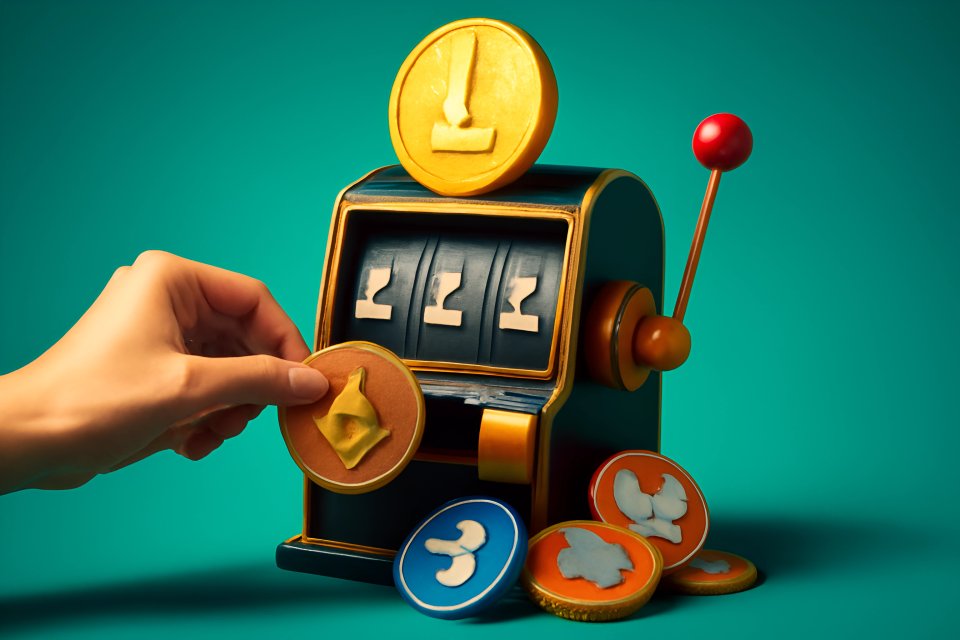
The dazzling lights, the instant payouts, the promise of games so fair they're mathematically proven – crypto casinos beckon with an irresistible allure. They whisper of a new era in gambling, one built on the bedrock of blockchain transparency and lightning-fast transactions. But beneath this shimmering surface, what unseen gears are turning, and more importantly, what happens if they grind to a halt, or worse, are deliberately sabotaged?
At the heart of this revolution lies the smart contract, the unsleeping, automated engine powering much of what makes crypto casinos tick. These digital agreements manage everything from the intricate logic of your favorite slot game to the crucial process of paying out your hard-won crypto. They are the invisible arbiters, designed to execute flawlessly, without bias or human intervention. Yet, here’s the stark truth many overlook: these contracts, despite their sophistication, are not infallible. A single bug, a cleverly hidden vulnerability, or outright malicious code can transform your dream win into a digital nightmare, leading to devastating losses. Are you, the informed gambler, truly aware of these specific, insidious risks lurking in the code?
This isn't about fear-mongering; it's about empowerment. This deep dive is forged for you, the player who demands more than just luck. We will dissect the world of smart contracts in crypto casinos, equipping you with the critical knowledge to understand their potential pitfalls and evaluate their security. By the end, you'll be armed to make safer, more informed choices, ensuring your journey into the crypto casino landscape is thrilling for all the right reasons. Your financial security and peace of mind are paramount.
What Are Smart Contracts and Why Do Crypto Casinos Use Them?
Imagine a high-tech vending machine, but instead of dispensing snacks, it runs complex casino operations. You insert your crypto (the condition), and the machine automatically executes a predefined action – perhaps dealing a hand in poker, spinning a roulette wheel, or instantly transferring your winnings. That, in essence, is a smart contract: a self-executing contract with the terms of the agreement directly written into lines of code. They live on a blockchain, making them transparent and, once deployed, typically immutable.
In the vibrant world of crypto casinos, these digital workhorses are indispensable. They are the silent, efficient backbone for a multitude of critical functions. Smart contracts can automate game logic, ensuring that dice rolls or card shuffles (if conducted on-chain) are executed according to programmed rules, often forming the basis of provably fair mechanisms that allow you to verify the randomness and fairness of game outcomes. Furthermore, they seamlessly handle deposits and withdrawals, often processing transactions far faster than traditional online casinos. They are also instrumental in distributing winnings and bonuses directly to player wallets and, in fully decentralized platforms, can even manage player funds without a central custodian, as detailed in insights on smart contracts in crypto casinos.
The ultimate allure of smart contracts in this domain is the pursuit of a "trustless" environment. The idea is revolutionary: instead of trusting a casino operator (a third party who could, in theory, manipulate games or withhold funds), you trust the code. Because the contract's rules are transparent and its execution is automated by the blockchain network, the need for an intermediary is theoretically diminished, fostering a new level of confidence built on verifiable cryptographic proof. This shift towards trust through code is a cornerstone of the crypto casino appeal, promising a fairer and more secure gaming experience.
The Hidden Dangers: Common Smart Contract Vulnerabilities in Casino Environments
"Code is law" – it's a powerful mantra in the blockchain world, suggesting that the rules embedded in a smart contract are absolute and unchangeable. But what happens when that law is flawed, poorly written, or maliciously designed? The stark reality is that imperfect code can be, and often is, exploited, leading to catastrophic consequences for unsuspecting users. The very automation and immutability that make smart contracts appealing can become a double-edged sword when vulnerabilities are present.
Let's unmask some of these hidden dangers that can turn a crypto casino experience sour:
Reentrancy Attacks
Imagine a faulty ATM that lets you withdraw cash, then, before it registers the withdrawal, lets you withdraw again, and again. A reentrancy attack on a smart contract is similar. An attacker can trick a vulnerable contract (often a withdrawal function in a casino) into repeatedly calling itself, draining funds before the contract can update its balance. This type of exploit has been a notorious culprit in numerous DeFi hacks, and casino contracts handling large volumes of transactions are prime targets if not meticulously secured.
Integer Overflow/Underflow
Computers have limits on the size of numbers they can store. An integer overflow occurs when a calculation results in a number larger than this limit, causing it to "wrap around" to a small number. Conversely, an underflow happens when a calculation results in a number smaller than the minimum, wrapping around to a large one. In a casino context, this could mean a massive bet is registered as a tiny one, or a small win is incorrectly calculated as a colossal payout, as explained in detailed analyses of integer overflows and underflows. Such mathematical errors can completely distort game fairness and financial integrity.
Gas Limit Issues & Denial of Service (DoS)
Every operation on blockchains like Ethereum requires "gas" (a fee). If a smart contract function is too complex or inefficient, it might require more gas than the block limit allows, causing transactions to fail. This can lead to a Denial of Service (DoS), where players can't execute critical actions like withdrawing funds or even playing games, effectively locking their assets or disrupting gameplay. Complex casino games with many on-chain interactions are particularly susceptible if not optimized for gas efficiency.
Oracle Manipulation
Many crypto casino games, especially those involving real-world events like sports betting, rely on "oracles" – external services that feed data (like match scores or financial prices) into the smart contract. If this oracle is compromised or the data feed is insecure, attackers can manipulate the input data, thereby influencing game outcomes to their advantage. Imagine betting odds being unfairly skewed just before a payout.
Timestamp Dependence
Some smart contracts might use block timestamps (the time a block is added to the blockchain) for game logic, like determining a winner or triggering an event. However, miners have a small degree of control over timestamps. While usually minor, this manipulability can be exploited in certain scenarios, especially if significant financial decisions within the casino game hinge on precise timing, a risk highlighted by security firms like Halborn.
Logic Errors & Bugs
Beyond complex exploits, simple human error in coding remains a significant threat. A misplaced decimal, a faulty if-then statement, or an overlooked edge case can lead to unintended behavior. This could mean incorrect payout conditions, unfair advantages to certain players, or even pathways for siphoning funds that the developers never anticipated. These are often the "low-hanging fruit" for attackers.
Centralization Risks
Ironically, some smart contract systems introduce centralization risks. If "admin keys" or special privileged accounts have the power to unilaterally change contract rules, pause functionality, or withdraw funds, the system is not truly decentralized. Should these keys be compromised or misused by a malicious internal actor, the entire integrity of the casino's smart contract can be undermined, a concern particularly relevant for upgradable contracts.
Lack of Proper Testing/Auditing
Perhaps the most overarching risk factor is the failure to conduct thorough testing and, crucially, independent security audits. Many devastating exploits could have been prevented if the code had undergone rigorous scrutiny by experienced security professionals before deployment. An unaudited smart contract is like an uninspected bridge – you cross it at your own peril. The importance of comprehensive smart contract audits cannot be overstated.
These vulnerabilities aren't just theoretical; they have led to substantial losses in the broader crypto space. While specific casino exploits are often less publicized unless massive, the underlying technical weaknesses are identical. Your awareness is the first line of defense.
Your Investigator's Toolkit: How to Evaluate Crypto Smart Contract Security
Feeling a bit overwhelmed? Don't be. You're not expected to become a Solidity developer overnight to safeguard your crypto. However, just like you'd check reviews before booking a hotel, you can look for crucial indicators of a crypto casino's smart contract security. Think of yourself as a digital detective, piecing together clues to assess the risk. Your financial well-being depends on this vigilance.
1. Security Audits are Non-Negotiable
This is your absolute starting point. What is a smart contract audit? It's an independent, meticulous review of the contract's code by specialized security firms. These experts hunt for vulnerabilities, logic flaws, and potential exploits. You should actively seek out audit reports, typically found on the casino's website, their blog, or the auditor's official site. When you find one, don't just glance at it. Look for the reputation of the auditing firm (e.g., OpenZeppelin, ConsenSys Diligence, Trail of Bits, Halborn, CertiK). Pay close attention to the scope of the audit (what exactly was reviewed?), any critical or high-severity issues uncovered, and, most importantly, documented proof that these issues were successfully remediated by the casino's developers. An audit that finds nothing is rare; an audit that shows issues were fixed is a good sign.
2. Code Transparency & Open Source
Is the casino's smart contract code playing hide-and-seek, or is it out in the open for everyone to see? True transparency means the contract code is publicly verifiable on a block explorer like Etherscan (for Ethereum-based contracts) or BscScan (for Binance Smart Chain). Why does this matter? Open-source code allows the entire community – from independent security researchers to curious developers – to scrutinize it. This collective oversight can uncover vulnerabilities that a single audit might miss. You can usually find a contract address on the casino's platform or in their documentation; pasting this into a block explorer allows you to view the code tab. Foundation's approach to verified open-source contracts is a good example of this transparency in action.
3. Team & Project Reputation
Who are the masterminds behind the crypto casino or the specific game you're interested in? Are the developers known, doxxed (publicly identified), and do they have a proven track record in the blockchain space? Or are they an anonymous, shadowy collective? While anonymity isn't an automatic red flag in crypto, a transparent team with demonstrable expertise and a positive project history generally inspires more confidence. Scour community channels like Discord, Telegram, and forums for sentiment, but always take overly enthusiastic or FUD-filled comments with a grain of salt. Look for consistent, professional engagement from the team.
4. Bug Bounty Programs
Does the platform actively invite white-hat hackers to find and report vulnerabilities in exchange for rewards? A bug bounty program, often hosted on platforms like Immunefi, is a strong indicator of a project's proactive commitment to security. It shows they are willing to invest in ongoing security measures beyond initial audits. For instance, Polygon runs a significant bug bounty program, offering substantial rewards for critical discoveries. This continuous vigilance is what you want to see.
5. (Advanced) Basic Red Flags in Code (for the very curious)
If you're feeling adventurous and decide to peek at the code on a block explorer (again, this is not a substitute for professional audits), there are a few high-level things even a non-coder might spot. Is the code excessively complex and convoluted without clear comments or documentation? This can make it harder to audit and easier to hide malicious logic. Does the contract contain functions that grant powerful owner or admin privileges (like setOwner, withdrawAllTokens) without safeguards like multi-signature (multi-sig) requirements or timelocks (delay mechanisms for changes)? These could be potential centralization risks. Extreme caution here: interpreting code without expertise is risky.
6. Testnet Performance & Beta Testing
Look for evidence that the casino platform and its smart contracts underwent thorough testing on a test network (testnet) before launching on the main network (mainnet). While testnet environments can't perfectly replicate all mainnet conditions (like real-world gas fees or network congestion), a robust beta testing phase and clear communication about testnet performance show a commitment to ironing out bugs before real user funds are at stake. This complements, but doesn't replace, the need for mainnet audits.
Equipping yourself with this investigator's toolkit transforms you from a passive participant into an active guardian of your own crypto assets. Demand transparency, scrutinize the evidence, and never settle for ambiguity when your funds are on the line.
Safeguarding Your Crypto: Practical Steps for Gamblers
Understanding the battlefield is one thing; knowing how to navigate it safely is another. Beyond evaluating the casino's smart contracts, there are practical, actionable steps you, the savvy gambler, can take to significantly reduce your risk exposure. It's about building layers of security, both in how you choose platforms and how you manage your own assets. Don't leave your financial safety entirely in the hands of others; take control.
Your first principle should always be: start small. Especially when dealing with new, lesser-known, or recently launched crypto casinos, never dive in with a significant portion of your bankroll. Test the waters with amounts you are entirely comfortable losing. This allows you to experience the platform's functionality, withdrawal process, and customer support without risking a catastrophic loss if something goes awry with an unaudited or experimental smart contract system. Think of it as a low-cost reconnaissance mission.
Next, diversify your play. It's an age-old investment wisdom that applies equally to crypto gambling: don't put all your eggs in one basket. Spreading your crypto assets across multiple reputable platforms mitigates the risk of a single smart contract vulnerability or platform failure wiping out your entire gambling fund. If one casino experiences an issue, your exposure is limited. This is a core tenet of responsible crypto gambling.
Always understand platform disclaimers and terms of service. Buried in the fine print, what liability does the casino actually accept for smart contract failures or exploits? Many platforms will attempt to limit their liability. Knowing their stance upfront helps you make a more informed decision about the risks you're accepting. If the terms are vague or overly one-sided, that's a red flag in itself.
Stay vigilant and stay informed. The crypto security landscape is constantly evolving. Follow reputable crypto news outlets, security researchers, and audit firms on social media or through newsletters. Being aware of newly discovered vulnerabilities or ongoing threats can help you react quickly, perhaps by withdrawing funds from a platform that uses a compromised technology or by avoiding new casinos that haven't addressed known issues. Knowledge of emerging threats and oracle updates is crucial.
Make it a habit to prioritize audited platforms. While an audit isn't an ironclad guarantee of 100% security, it's a massive step in the right direction. Give strong preference to crypto casinos that transparently share their complete, unedited audit reports from well-regarded firms like OpenZeppelin or Halborn. The willingness to undergo and publish an audit speaks volumes about a platform's commitment to security and transparency. If you're looking for ways to enhance your gameplay on such platforms, consider exploring advanced crypto casino strategies once you're confident in their security.
Learn to recognize overarching red flags. Beyond specific smart contract code, be wary of platforms making unrealistic promises of guaranteed high returns, those operating with complete team anonymity and no discernible track record, or those exhibiting a general lack of transparency about their operations or licensing. If it feels too good to be true, or too opaque, it probably is. This complements the broader advice found in our guide on avoiding common crypto casino scams.
Finally, never neglect your personal crypto hygiene. Smart contract risks are one layer of potential danger; how you secure your own wallet and private keys is another, equally critical layer. Use strong, unique passwords, enable two-factor authentication (2FA) wherever possible, and consider using hardware wallets for storing any significant amount of cryptocurrency. Your personal security practices are fundamental to protecting your assets, a principle that ties into effective digital bankroll management.
Conclusion: Betting Smarter in the Age of Smart Contracts
The journey through the intricacies of smart contracts reveals a powerful truth: they offer immense, game-changing potential for crypto casinos, ushering in new levels of transparency and efficiency. Yet, this innovation is not without its shadows. The very code that promises fairness and automation can, if flawed or exploited, become a conduit for loss. The allure of "trustless" systems must always be tempered with a healthy dose of informed skepticism and diligent verification.
But here’s the empowering takeaway: you are not helpless in this complex digital arena. By understanding the common vulnerabilities, by knowing what questions to ask, and by learning how to look for critical indicators like security audits and code transparency, you transform from a mere player into an informed, discerning gambler. You gain the power to significantly enhance your safety, protect your hard-earned crypto, and choose platforms that genuinely prioritize your security. This knowledge is your shield and your sharpest tool.
The future of crypto gambling, we believe, is an audited one. As the space matures, the demand for rigorous security practices, transparent operations, and verifiable smart contracts will only intensify. Platforms that embrace this ethos will thrive; those that neglect it will, and should, fade. This evolution is crucial for building sustainable trust and ensuring the long-term viability and appeal of decentralized gaming solutions.
At Crypto Casino Sharks, our commitment is unwavering: to cut through the hype, demystify the technology, and provide you with the sharp analysis and actionable strategies needed for secure and informed crypto gambling. We believe that an educated gambler is a safer gambler, and a more successful one. Your journey into this exciting world should be thrilling, not terrifying.
Now, we turn it over to you. What are your biggest concerns about smart contract security in crypto casinos? Have you encountered any red flags or positive examples in your own experiences? Share your thoughts or experiences in the comments below – let's build a smarter, safer community together!
Key Takeaways
- Smart contracts are self-executing digital agreements that automate many crypto casino functions like game logic and payouts, but they are not immune to flaws.
- Common smart contract risks include reentrancy attacks (draining funds), integer overflows/underflows (calculation errors), oracle manipulation (tampering with external data), and general logic errors or bugs.
- Always prioritize crypto casinos that provide transparent, comprehensive third-party smart contract audit reports from reputable security firms.
- Open-source code verifiable on a block explorer, a strong and transparent development team reputation, and active bug bounty programs are positive indicators of a casino's commitment to security.
- Practice caution by starting with small amounts on new or unaudited platforms, diversifying your play across multiple casinos, and maintaining robust personal crypto security hygiene.
Glossary of Key Terms
- Smart Contract: A self-executing computer program or a transaction protocol that automatically executes, controls, or documents legally relevant events and actions according to the terms of a contract or an agreement.
- Reentrancy: A vulnerability where a smart contract function can be repeatedly called by an attacker before its initial invocation is finished, often used to drain funds.
- Integer Overflow/Underflow: A computational error that occurs when an arithmetic operation attempts to create a numeric value that is outside of the range that can be represented with a given number of bits – either too large (overflow) or too small, often wrapping around to an unexpected value (underflow).
- Oracle (in blockchain context): A third-party service that provides smart contracts with external information (e.g., price feeds, weather data, game scores) from outside the blockchain.
- Gas Limit: The maximum amount of "gas" (computational effort, paid in cryptocurrency) that a user is willing to spend on a transaction or smart contract execution on a blockchain like Ethereum.
- Security Audit (Smart Contract Audit): An independent review and analysis of a smart contract's code by security experts to identify vulnerabilities, bugs, and potential exploits before deployment.
- Etherscan: A popular block explorer and analytics platform for the Ethereum blockchain, allowing users to view transactions, smart contract code, and other on-chain data.
Disclaimer
The information provided in this blog post is for educational and informational purposes only. It does not constitute financial advice, investment advice, gambling advice, or any other sort of advice, and you should not treat any of the blog's content as such. Crypto Casino Sharks does not recommend that any cryptocurrency should be bought, sold, or held by you, nor do we recommend participation in any specific casino or gambling activity. Gambling and cryptocurrency investments involve significant risk of loss. Always gamble responsibly and never risk more than you can afford to lose. Consult with a qualified financial advisor before making any financial decisions.


















